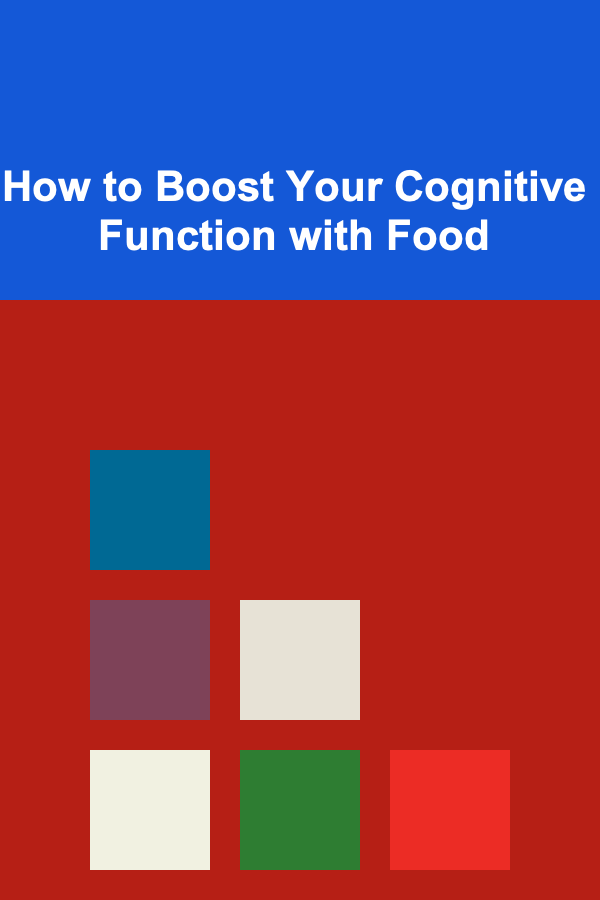
How to Boost Your Cognitive Function with Food
ebook include PDF & Audio bundle (Micro Guide)
$12.99$11.99
Limited Time Offer! Order within the next:

In today's fast-paced world, cognitive performance plays an essential role in determining our ability to succeed in both professional and personal environments. Cognitive function includes a variety of mental processes such as memory, attention, reasoning, and problem-solving. With an increasing emphasis on brain health, many individuals are exploring various methods to enhance cognitive function, and one promising area of improvement is nutrition.
While cognitive decline is often associated with aging, studies have shown that the foods we consume can play a crucial role in maintaining, and even improving, our mental abilities. A nutrient-rich diet not only supports the physical health of the brain but also promotes the neuroplasticity required to adapt and grow mentally. This article will explore the connection between food and cognitive function, highlight key nutrients that boost brain power, and offer practical advice on how to incorporate brain-boosting foods into your daily diet.
Understanding Cognitive Function
Cognitive function refers to the mental abilities that enable us to carry out tasks that involve thought processes. These functions are divided into several categories, including:
- Memory: The ability to retain and recall information.
- Attention: The capacity to focus mental effort on tasks or stimuli.
- Language: The ability to understand, process, and produce speech and written communication.
- Problem-Solving and Decision-Making: The process of analyzing information and selecting the best course of action.
- Learning: The ability to absorb new information and skills over time.
The brain is a complex organ, and cognitive function is influenced by various factors, including genetics, environment, education, and lifestyle choices. Of these factors, diet plays a significant role in maintaining brain health and performance.
The Link Between Diet and Brain Health
The brain is an energy-intensive organ, consuming approximately 20% of the body's energy at rest. To maintain optimal function, the brain requires a steady supply of nutrients, including glucose, vitamins, minerals, and antioxidants. Poor nutrition, on the other hand, can lead to brain fog, fatigue, impaired memory, and reduced cognitive performance. Research has shown that certain diets can positively impact cognitive function, while others may contribute to cognitive decline.
The Role of Neurotransmitters
Neurotransmitters are chemical messengers that transmit signals between nerve cells in the brain. These signals govern various brain functions such as mood, focus, and memory. Proper nutrition supports the production of neurotransmitters, which is crucial for cognitive function. For example, serotonin, dopamine, and acetylcholine are all essential neurotransmitters that influence mental states, motivation, and memory. The building blocks for these neurotransmitters come from the food we eat, especially amino acids derived from protein-rich foods, along with vitamins and minerals that aid their synthesis.
Inflammation and Brain Health
Inflammation is a natural immune response to injury or infection, but chronic inflammation can have a negative impact on brain health. It is linked to various neurodegenerative diseases, including Alzheimer's and Parkinson's disease. A diet rich in anti-inflammatory foods can help reduce this risk. Many brain-boosting foods contain compounds that have anti-inflammatory properties, such as omega-3 fatty acids, polyphenols, and antioxidants.
Key Nutrients That Support Cognitive Function
Several key nutrients are vital for boosting cognitive function. These nutrients play a role in protecting brain cells from damage, enhancing communication between neurons, and supporting overall brain health.
1. Omega-3 Fatty Acids
Omega-3 fatty acids, particularly EPA and DHA, are essential fats that play a crucial role in brain health. DHA, in particular, is a major structural component of brain cells and is involved in maintaining neuronal health. Studies have shown that omega-3 fatty acids can improve memory, mood, and cognitive performance. These fats also reduce inflammation and oxidative stress in the brain, both of which are linked to cognitive decline.
Food Sources of Omega-3s:
- Fatty fish (salmon, mackerel, sardines)
- Walnuts
- Flaxseeds and chia seeds
- Hemp seeds
- Algal oil
2. Antioxidants
Antioxidants help protect the brain from oxidative stress, which is caused by free radicals. Oxidative stress accelerates aging and contributes to cognitive decline. A diet rich in antioxidants can help mitigate the effects of aging on the brain and improve cognitive performance. Common antioxidants that support brain health include vitamins C and E, flavonoids, and polyphenols.
Food Sources of Antioxidants:
- Berries (blueberries, strawberries, raspberries)
- Dark chocolate (at least 70% cocoa)
- Leafy greens (spinach, kale)
- Nuts (almonds, walnuts)
- Green tea
3. B-Vitamins
B-vitamins, including B6, B12, and folate, are essential for brain function. These vitamins support the production of neurotransmitters, promote healthy nerve function, and help reduce the risk of cognitive decline. For example, vitamin B12 is crucial for maintaining the health of nerve cells and supporting memory. Folate is involved in the synthesis of DNA and RNA, making it critical for the growth and function of brain cells.
Food Sources of B-Vitamins:
- Leafy greens
- Whole grains
- Eggs
- Fish and poultry
- Legumes (beans, lentils)
- Dairy products
4. Vitamin D
Vitamin D is essential for maintaining overall health, including brain function. Research suggests that vitamin D deficiency is associated with an increased risk of cognitive impairment and neurodegenerative diseases. Vitamin D plays a role in regulating the expression of genes involved in neuroplasticity, the ability of the brain to adapt and form new neural connections.
Food Sources of Vitamin D:
- Fatty fish (salmon, tuna, mackerel)
- Fortified dairy products
- Egg yolks
- Mushrooms exposed to sunlight
5. Magnesium
Magnesium is a mineral that plays a key role in many physiological functions, including brain function. It helps regulate neurotransmitter activity, supports memory, and reduces the risk of neurodegenerative diseases. Studies suggest that magnesium deficiency may lead to cognitive impairment, while adequate magnesium levels support learning and memory.
Food Sources of Magnesium:
- Leafy greens (spinach, Swiss chard)
- Nuts and seeds (almonds, pumpkin seeds)
- Legumes (beans, lentils)
- Whole grains (brown rice, quinoa)
6. Curcumin
Curcumin is the active compound found in turmeric, a spice commonly used in Indian cuisine. It has powerful anti-inflammatory and antioxidant properties that can benefit brain health. Studies have shown that curcumin can increase levels of brain-derived neurotrophic factor (BDNF), a protein that supports the growth of new neurons and protects existing brain cells. It may also help reduce the risk of Alzheimer's disease and improve memory.
Food Sources of Curcumin:
- Turmeric (can be added to curries, soups, smoothies)
- Curcumin supplements
7. Polyphenols
Polyphenols are plant compounds that have strong antioxidant and anti-inflammatory effects. They are found in a variety of fruits, vegetables, and beverages, and are linked to improved cognitive function. Polyphenols help reduce oxidative stress and inflammation in the brain, which can improve memory and cognitive performance.
Food Sources of Polyphenols:
- Berries (blueberries, strawberries, blackberries)
- Apples
- Grapes
- Red wine (in moderation)
- Green tea
- Dark chocolate
Foods That Can Negatively Impact Cognitive Function
While certain foods support brain health, others may negatively affect cognitive function. Diets high in processed sugars, unhealthy fats, and refined carbohydrates can contribute to inflammation, oxidative stress, and insulin resistance, all of which are linked to cognitive decline.
1. Sugar
Excessive sugar intake is associated with insulin resistance and impaired brain function. High blood sugar levels can lead to inflammation and damage to brain cells, potentially contributing to conditions such as Alzheimer's disease. Avoiding sugary foods and drinks can help protect the brain and promote cognitive function.
2. Trans Fats
Trans fats, often found in processed foods, are known to increase inflammation and oxidative stress in the body. These unhealthy fats can impair cognitive function, particularly in the areas of memory and learning. Reducing the intake of trans fats is essential for maintaining brain health.
Foods to Avoid:
- Fried foods
- Baked goods containing partially hydrogenated oils
- Fast food and processed snacks
3. Refined Carbohydrates
Refined carbohydrates, such as white bread, pasta, and pastries, can lead to blood sugar spikes and crashes. These fluctuations in blood sugar levels can negatively affect brain function and mood. Whole grains and complex carbohydrates are a better option for steady energy and cognitive performance.
Practical Tips for a Brain-Boosting Diet
Incorporating brain-boosting foods into your diet doesn't have to be complicated. Here are some practical tips to get started:
- Eat a variety of whole foods: Focus on nutrient-dense foods, including fruits, vegetables, whole grains, lean proteins, and healthy fats.
- Incorporate healthy fats: Include sources of omega-3 fatty acids, such as fatty fish and walnuts, and reduce your intake of trans fats and processed foods.
- Snack smart: Opt for brain-boosting snacks like nuts, seeds, and berries instead of sugary or processed snacks.
- Drink plenty of water: Dehydration can impair cognitive function, so make sure to stay hydrated throughout the day.
- Limit sugar and refined carbs: Reduce your intake of sugary drinks, sweets, and refined carbohydrates to support brain health.
Conclusion
Food plays a crucial role in supporting cognitive function and maintaining brain health. By incorporating nutrient-rich foods into your diet, you can enhance memory, focus, and problem-solving skills. Omega-3 fatty acids, antioxidants, B-vitamins, and other brain-boosting nutrients can improve cognitive performance and protect the brain from age-related decline. On the other hand, reducing the consumption of processed foods, sugars, and unhealthy fats can help reduce inflammation and oxidative stress, both of which are harmful to brain health.
A balanced, nutrient-dense diet is one of the most effective ways to promote long-term brain health and cognitive performance. So, the next time you sit down for a meal, consider the powerful impact that your food choices can have on your mental well-being.

How to Create a Lease Agreement That Protects Both Parties
Read More
How to Keep Your Car Clean with Simple Daily Habits
Read More
How to Plan a Home Party with Perfectly Paired Food and Drinks
Read More
What Are the Top Tips for Organizing Schedules and Appointments?
Read More
How to Use Social Media for Cause Marketing
Read More
How to Bake for Potlucks and Parties
Read MoreOther Products

How to Create a Lease Agreement That Protects Both Parties
Read More
How to Keep Your Car Clean with Simple Daily Habits
Read More
How to Plan a Home Party with Perfectly Paired Food and Drinks
Read More
What Are the Top Tips for Organizing Schedules and Appointments?
Read More
How to Use Social Media for Cause Marketing
Read More